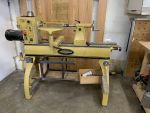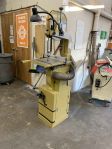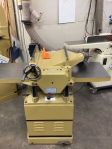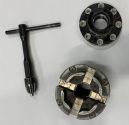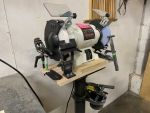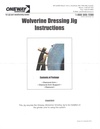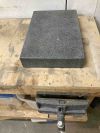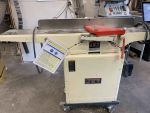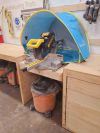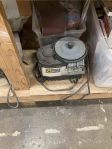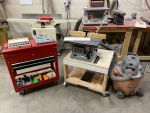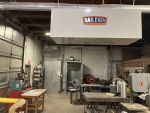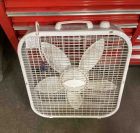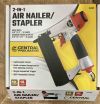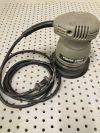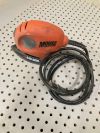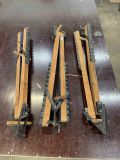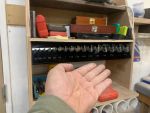Difference between revisions of "Wood Shop"
| Line 250: | Line 250: | ||
| | | | ||
|} | |} | ||
| + | |||
<gallery widths="200" heights="125"> | <gallery widths="200" heights="125"> | ||
File:Lathe chuck.jpg|alt=Lathe chuck|'''Lathe chuck''' | File:Lathe chuck.jpg|alt=Lathe chuck|'''Lathe chuck''' | ||
| − | |||
</gallery> | </gallery> | ||
Latest revision as of 15:21, 13 December 2024
The Wood Shop Area at Pikes Peak Makerspace (PPM) consists of
both Level 2 and Level 3 equipment.
Additional PPM training and then PPM certification is required to use any of our Level 3 equipment.
Our trainers are passionate about sharing their knowledge and ensuring a positive learning experience for all.
We are grateful for their commitment and dedication to our community.
Wood Shop Area hand tools should be marked with green tape, paint, or powder coating.
The SawStop in the PPM Wood Shop cannot be turned on without scanning the RFID card of a certified member in our T.E.S.L.A. Access system.
Contact Us if you cannot find your answer here on our Wiki or if you notice any information that is outdated.
Wood Shop Policy, Safety, and Orientation
All Wood Shop users are required to follow all Wood Shop Policies and Safety Procedures.
Members are required to pass the Wood Shop Safety Quiz with 90% or better before attending the in-person orientation.
Emergency Safety - Review the Wood Shop layout to know the nearest emergency exits, eye wash, first aid kits, fire extinguishers, and breaker box in case of emergency.
- By using Pikes Peak Makerspace (PPM) you are agreeing to the shop policies and to operate equipment and use the space safely. Personal safety is your responsibility.
- Damage to tools, equipment, the shop itself caused by your actions is solely your responsibility.
Impairment - The use of the Wood Shop equipment requires you to be alert, attentive and focused.
- Do not use the Wood Shop, any PPM work area, or any PPM tools, if you are under the influence of drugs or alcohol.
- Likewise, ensure that you are well-rested and alert.
Personal Protective Equipment (PPE)
- Safety Glasses - Safety glasses are required when you are operating hand or stationary powered tools in the Wood Shop.
- Additionally, safety glasses are required if you are in the Wood Shop, and someone else is operating powered tools. (ANSI Z87.1-impact resistant) safety glasses are required. These are rated for impact protection and have side shields to provide protection from objects coming from the front and sides. Most prescription glasses are not impact resistant or provide side protection. If you use prescription glasses, then put an ANSI Z87-1 goggle over them.
- Hearing Protection - Hearing protection is required when you are operating stationary powered tools, or someone else is operating machinery in the Wood Shop. There are two types of hearing protection
- Soft Foam earplugs are available. To get the best protection roll the foam with your fingers to condense the plug. Pull the top of your ear up and back with the opposite hand, and insert the plug into your ear canal. Hold the plug with your finger for 20-30 seconds to let the plug expand and fill your ear canal. Your voice will sound muffled if the plug has a good seal.
- Ear muffs are available. These fit over both ears and have sound attenuating material and soft ear cushion to fit around the ears.
- Respiratory Protection - Particulate filter respirator should be used when significant wood dust is being generated (when emptying the dust collector).
- Shoes - Closed toe shoes are required. If working with heavy lumber, consider safety shoes (steel or composite) to protect your toes if materials or tools are dropped.
- Gloves - Gloves should not be worn when using powered equipment (saws, jointers, drills, or other equipment). Leather gloves can be worn for handling materials, but not when operating machinery.
- Hair and Clothing - There are many moving parts in the Wood Shop that can get caught and pull you into mechanical equipment. Tie back long hair when operating machinery. Also ensure that sleeves, hoodie strings, and any loose clothing is secured.
- Jewelry - Remove rings, bracelets and any other jewelry that could get caught when operating equipment.
Hazards
The following are a list of hazards that should be considered while working in the Wood Shop.
- Wood Dust - Exposure to wood dust has been associated with a variety of adverse health effects including dermatitis, respiratory effects and cancers. Engineering controls include local exhaust ventilation which removes dust at or near the source. To be effective the dust collection system needs to be maintained. Check and clean the dust collection system to ensure they are working properly. Additionally, particulate filters, or respirators can be worn to protect personnel directly.
- Noise - The machinery in the Wood Shop can exceed 85 decibels in noise. This can impair hearing if you are exposed to it over a sustained amount of time. Noise levels can be reduced by maintaining motors and moving parts in top operating conditions, reducing the speed of operation, ensuring the equipment frames are rigid and isolating noisy equipment on rubber footing. Additionally, hearing protection (ear muffs, and ear plugs) can be used to reduce individual exposure to loud noises while working in this area.
- Electrical Hazards - To minimize the danger of electrical hazards, machines must always be grounded, circuit breakers and fuse boxes labeled, cords, cables and plugs must be in good repair, and outlets and switches must be covered. Report any unsafe condition found by using posting on #red-tags-issues on Slack and putting a filled out red-tag on the equipment to prevent its use until it is repaired.
- Machine Maintenance - Equipment needs to be properly maintained to function safely. If there is any indication that the machine is not functioning properly, don’t use it. Report any unsafe condition found by using posting on #red-tags-issues on Slack and putting a filled out red-tag and/or lock-out/tag-out device on the equipment to prevent its use until it is repaired.
- Fire and Explosion - Woodworking facilities contain large quantities of fuel in the form of woods, wood products, and sawdust, (and also paints, oils finishes, solvents, and other flammable liquids). Sawdust can ignite and burn far more easily than whole pieces of lumber. Regular maintenance must be done to ensure that dust is not accumulating in the area.
- Electrical panels must be kept clear.
- Fire extinguishers and exit routes must always be accessible.
- It is important for every user to ensure that they perform effective clean-ups of the equipment and the area to reduce the build up of wood dust, the separation of flammable materials, the proper maintenance of equipment.
Reporting Issues
Injuries
If there is a personal injury requiring medical attention, dial 911 and obtain medical treatment.
Report any accidents or personal safety issues (including near-misses) as soon as possible with one of these methods:
- Call 719-445-MAKE(6253) and leave a detailed message including:
☐ Your name and phone number
☐ Who was injured and their phone number
☐ Describe the injury, part of body
☐ Detail what type of medical attention was sought
☐ Describe how the accident occurred
☐ Include the equipment that was being used
- Send a direct message to our Executive Director on Slack
- Use the form on the PPM website to Contact Us
- Include all the same information listed in the checklist above
Equipment Issues
Red-Tag Equipment – If equipment needs repairs, place a red-tag on it and report it via the Pikes Peak Makerspace Slack, #red-tags-issues channel. This advises others on the malfunctioning equipment and ensures that actions can be taken to service/repair the equipment.
Red Tags
- • Any damage to tools or broken equipment MUST be reported in a direct message to an Area Deputy or our Director.
- • Use a Red Tag to designate the broken equipment.
- • Additionally, report the issue in our Slack #red-tags-issues channel.
Equipment Information
- Be knowledgeable about the equipment that you are using.
Laminated Placards
- There are laminated placards with detailed equipment information hanging on each of the large Wood Shop power equipment. These can also be found in the PPM Wiki under Wood Shop- Training ("PPM Jointer Safety and Operations", for example)
- More detailed information can be found on the PPM Wiki/Wood Shop page. Vendor supplied Operation, Instruction, and parts lists can be found as links on that page. Most equipment manuals have specific information on capabilities, maintenance, adjustments, and parts lists. Use the specific equipment manual for setup, changing blades, auxiliary attachments, alignments, and general maintenance.
Getting Help
- Use the #wood-shop channel on Slack to get help with specific equipment.
- Utilize tutorial videos on-line that provide general information on many of the Wood Shop tools, techniques, and safeguards.
Dust Collection and Air Handler
Woodworking creates wood chips, dust and fine dust. There are three reasons for dust collection.
- Fine particulate matter is a health hazard that can be a respiratory irritant in the near-term, and a more serious health condition with long-term exposure.
- Fire Danger – A Wood Shop without dust collection has combustible dust everywhere, floors, tools, light fixtures, machinery housing, furnaces, and electrical boxes. Dust increases the chance for a fire start or acceleration if in contact with heaters, hot fixtures, machine housings, and other sources.
- Annoyance – True craftsmen work to precision high quality standards. Chips and dust can impact accuracy, joinery, final finishes, and the quality of the final product. Dust in machinery means more maintenance is needed. Plus, people prefer to work in clean environments.
Reclaimed Materials Usage
Use Metal Detector
Scan the Wood for Metal - Use a hand-held metal detector wand on all reclaimed wood stock. It will locate remaining screws, nails and other metal parts. Any identified metal needs to be removed prior to cutting or shaping on woodworking equipment.
Upcycled Wood
Don’t bring any wood that has lead paint, bugs, or toxic materials to PPM Wood Shop. Paint must be removed prior to bringing to PPM for any up-cycled lumber project. Many pallets are treated with toxic pesticides, such as methyl bromide. Additionally, there can be residuals of toxic chemicals left on pallets, or bacteria from food shipments.
Here are some resources about reclaimed wood:
https://earth911.com/health/how-to-safely-use-pallet-wood/
https://rockinwoodusa.com/is-reclaimed-wood-safe/
Recycling wood has ecological and aesthetic value. But, only if it is not exposing you and PPM members to hazardous materials.
Acceptable Materials
The equipment in the Wood Shop is configured with blades and bits for working with the following materials:
- Solid wood
- Plywood
- MDF (Medium Density Fiberboard)
- Upcycled/recycled wood (see caution on use above)
Banned Materials
- Metals
- Composite decking material ("Trex", for example - requires a special blade and will quickly dull standard woodworking blades)
Plastics & Resin
It is important to research all materials before cutting and take precautions to ensure there are no harmful fumes released and no chips blocking the tool's functionality or the dust collection ability.
Paint or Solvents
Do not apply Paints or Solvents in the Wood Shop. There are too many combustible materials and the odor is bothersome.
- Use the ventilated room, outdoors, or other location for applying paints or solvent-based finishes.
Check-in/ Check-out form
All woodshop users are required to use the Check-in/ Check-out form when using the shop areas.
Project Storage
Project storage is extremely limited and therefore must be carefully managed. Keep your project out of the way, and do not leave it unattended for multiple days or it is subject to removal.
All projects left in the woodshop must be labeled with green Project Storage tags.
Clean-up
If you do not have time to clean up, you do not have time to build it.
Woodworking projects tend to have 3 parts:
- “Plan it. Build it. Clean up after it.”
☐ Clean up the area and equipment that you used.
☐ All equipment should be ready for the next member to use right away.
☐ Return all hand tools to their proper location after use. If you don't know where it goes, ask an Area Deputy. This rule applies to all areas of our Makerspace.
☐ Go to the Cleaning Sequence sheets hanging on the Wood Shop door:
Cleaning Sequence (Required)
To ensure that the deep cleaning of the space is maintained, all members are required to do a cleaning task from the sequence flip chart.
If you have comments about the cleaning sequence, leave a note on the Check-out form.
Classes
- Woodshop Orientation & SawStop Certification:
- A combo class designed for new-to-woodshop members is offered twice per month on Saturday mornings.
- Sign up for upcoming classes on Meetup! Upcoming events, including classes, on Meetup
PPM Training
- If you need help with a tool or technique, use the #wood-shop channel on Slack.
- Woodworking terminology
- Introduction to Woodworking
Tips
Links to external sites:
- POWERMATIC MANUALS
- Fine Wood Working Magazine Shop Tips
- Our wood working-related books — on LibraryThing.com
Equipment Lists
POWERMATIC Equipment List
| Picture | Item | Manufacturer | Model Number | Power Requirements |
Resources |
Woodturning Lathe, 18" extension, swing away tail stock, |
POWERMATIC 3520B | Single Phase,
220V, 60Hz, 6.2A |
Operating Instructions and Parts Manual | ||
| 14" Woodworking Band Saw,
rip and cross-cut fences, |
POWERMATIC PWBS‑14 | Single Phase,
115V, 60Hz, 11A |
Operating Instructions and Parts Manual | ||
| 15-inch Planer,
4" Dust Port |
POWERMATIC 15HH | Single Phase,
230V, 60Hz, 15A |
Operating Instructions and Parts Manual | ||
| 6" Belt/ 12" Disc Combination Sander |
POWERMATIC 30B | 3-phase | Replacement Parts | ||
Sharpening and Sanding Equipment List
| Picture | Item | Manufacturer | Model Number | Resources |
| 8" bench grinder, blue and white grinding stones, Wolverine and Veritas sharpening devices, buffing wheel and compounds |
JET | JET
JWBG‑8 |
||
| variable speed buffer and buffing wheels |
DeWALT
DWP849 |
|||
| sanding belts, disks and sheets | 3M | |||
| precision ground granite block, 12"x18"x3" | ||||
- Do not store tools, or anything, on our granite block to avoid damage to its surface.
Wood Shop Equipment List
| Picture | Item | Manufacturer | Model Number | Power Requirements |
Resources |
| 8" Jointer, 2 HP Motor,
with SHELIX cutting head |
JET | JJ-8CS | single phase,
110 Volts, 15 Amps, 60HZ |
JET | |
| 12" Sliding Compound
Miter Saw, dust hood & RIGID vacuum |
DeWALT DW708 | single phase,
110 Volts, 13 Amps, 60HZ |
|||
| wood tool sharpener | WORK SHARP | WS3000 | single phase,
110 Volts, 2 Amps, 60HZ |
||
| Router and Shaper with bits on rolling carts | DELTA | single phase,
110 Volts, 9 Amps, 60HZ |
|||
| Floor drill press | PORTER-CABLE | single phase,
110 Volts, 8 Amps, 60HZ |
PORTER-CABLE | ||
| 6" Disk 4" Belt Sander | WEN | 6502T | single phase,
110 Volts, 4.3 Amps, 60HZ |
WEN | |
| 1" x 30" belt & 5" disk sander | Dremel | single phase,
110 Volts, 3 Amps, 60HZ |
|||
| AIR FILTRATION SYSTEM
with remote |
BAILEIGH | AFS-2400 | single phase,
110 Volts, 14 Amps, 60HZ |
BAILEIGH | |
| Box fan,
20", 3-speed |
LASKO | ||||
| Dust Collector 1.5HP 6" inlet |
DELTA | DELTA | |||
Power Tools
'A Tool Is Just An Opportunity With A Handle' ~Kevin Kelly
| Picture | Item | Manufacturer | Model Number |
Resources | Owner |
| COMPACT ROUTER
M18 FUEL |
Milwaukee
2723-20 |
2723-20 | |||
| JIG SAW
M18 FUEL D-Handle |
Milwaukee
2737-20 |
2737-20 | PPM | ||
| Circular Saw,
185mm |
Makita
5007NB |
5007NB | |||
| Router | Makita
3601B |
INSTRUCTION MANUAL | |||
| RECIPROCATING SAW | DeWALT
DW304P |
||||
| JIG SAW | DeWALT
DW331 |
||||
| Jig Saw | BOSCH | BOSCH
1590EVS |
|||
| AIR NAILER/
STAPLER |
CENTRAL PNEUMATIC | 64269 | 64269 | ||
| Biscuit
Joiner |
Craftsman | Craftsman | |||
| Circular
Saw |
Craftsman | Craftsman | |||
| Orbital Sander | PORTER-CABLE | Quicksand | |||
|
Mouse Sander/Polisher |
BLACK&DECKER
FMS50 |
||||
| Belt Sander
(handheld) |
Craftsman | Craftsman | |||
| Belt Sander
(handheld) |
RYOBI | ||||
Clamps
| Item | Manufacturer | Model | Quantity | Owner |
| 6" Wooden Handscrew Clamps | ROCKLER | Wooden Handscrew Clamps | 2 |
PPM |
| 8" Quick Clamp | Irwin | Irwin
Quick Grip |
2 |
PPM |
| 12" Quick Clamp | Irwin | Irwin
Quick Grip |
2 |
PPM |
| 36" Quick Clamp | Irwin | Irwin
Quick Grip |
1 |
Bill Epperson |
| 30" Pipe Bar Clamp | Bessey | BESSEY Tools North America | 4 |
Bill Epperson |
| 48" Pipe Bar Clamp | Bessey | BESSEY Tools North America | 2 |
Bill Epperson |
| 60" Pipe Bar Clamp | Bessey | BESSEY Tools North America | 2 |
Bill Epperson |
| 36" Quick Release Steel Bar Clamp | Jorgensen | CABINET MASTER 8036 | 5 |
PPM |
| 6" Quick Release Bar Clamp | 2 |
Bill Epperson | ||
| 12" Quick Release Bar Clamp | 0 |
PPM | ||
| 18" Quick Release Bar Clamp | 0 |
PPM | ||
| 24" Quick Release Bar Clamp | 2 |
PPM | ||
| 30" Quick Release Bar Clamp | 0 |
PPM | ||
| 36" Quick Release Bar Clamp | ITEM 60539 | 6 |
PPM | |
| 60" Quick Release Bar Clamp | ITEM 60673 | 2 |
PPM | |
| 50" CLAMP & CUT EDGE GUIDE | ITEM 66581 | 1 |
PPM | |
| 6" Ratcheting Bar Clamp | 0 |
PPM | ||
| 12" Ratcheting Bar Clamp | 6 |
PPM | ||
| 24" Ratcheting Bar Clamp | 0 |
PPM | ||
Hand Tools
| Picture | Item | Manufacturer | Owner |
Dead Blow Hammer
|
PPM | ||
| Wood Clamps | PPM | ||
| 10 Million Dollar Stick | PPM | ||
| Forstner bit set
(16 bits) |
PPM | ||
- Wood Shop Area hand tools should be marked with green tape or paint or powder coating.
- Return all tools to their proper location after use. This rule applies to all areas of our Makerspace.
Benefits
- PPM members enjoy discounts at the following local merchants:
- (bring proof of membership)
| Company | Website | Benefit | Directions to |
| Woodcraft of Colorado Springs | 10% discount | 4438 Austin Bluffs Parkway | |
| CO Lumber Specialties | 10% discount | 3636 Stone Avenue | |
| GENERAL AIR | 10% discount | 3031 N Nevada Ave. | |
| ACE Hardware Uintah Gardens | 10% discount | 1830 W Uintah Street | |
- Map of stores that provide PPM member discounts
- Map of helpful local resources curated by our makers
- At home LightBurn subscriptions can be purchased at a discounted rate for being a PPM member.
- The discount code is saved as a Pinned Message in our 'laser-cutter' channel in Slack.
Donate for Materials and Consumables
Donated materials are available for member use, but should be compensated for by making a donation through one of the following methods:
- Donate via PayPal: bit.ly/ppmstuff
- Or, leave donations in a black payment box.
Hand-Curated Links
Links to member-recommended external sites:
- Colorado Woodworkers' Guild — learn and share information about woodworking
- Stumpy Nubs Woodshop — on YouTube
- Old Woodworking Machines (OWWM)
Additional Help
Links to related PPM Wiki pages:
- Use the PPM Slack channel #wood-shop
- List of all PPM Slack channels
- Note that we have a Slack channel (#job-board) for members to post, discuss, or accept job opportunities either within PPM or from the community.
Search the PPM Wiki — include Content pages as well as Multimedia.
Contact Us if you cannot find your answer here on our Wiki or if you notice any information that is outdated.

